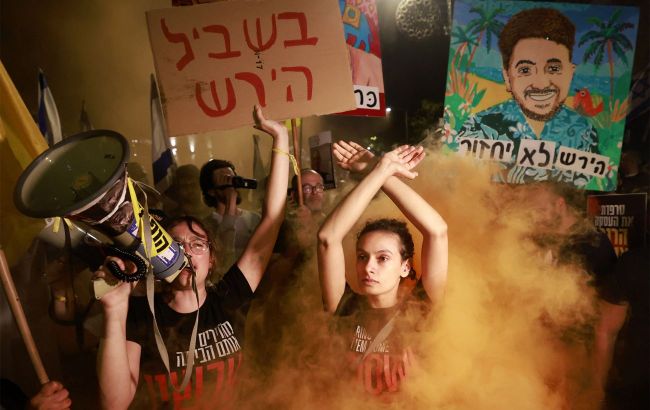Israel faces political crisis: Details revealed
 Protesters in Jerusalem (photo: Getty Images)
Protesters in Jerusalem (photo: Getty Images)
With the onset of autumn, mass protests swept across Israel.
Find out more about what they mean, and what consequences they might lead to in the RBC-Ukraine report.
Content
- What sparked protests?
- Who supports protests, and who is against them?
- How do protests affect political situation in Israel?
- What will happen with negotiations?
On the evening of September 1, protests erupted across Israel. Up to 500,000 people took to the streets in various cities across the country. Protesters blocked key highways, and clashes with police occurred. Despite the decreasing scale of the protests, these events reflect an extremely tense situation and deep divisions within Israeli society.
What sparked protests?
Protesters accused the government and Prime Minister Benjamin Netanyahu of allegedly delaying a deal with Hamas to secure the release of hostages. This can only be achieved through an agreement with militants to cease hostilities in the Gaza Strip.
The immediate trigger for the protests was the killing of six Israeli hostages by Hamas. Their bodies were found in a tunnel under the city of Rafah in the southern Gaza Strip. According to representatives of the Israel Defense Forces, the hostages were killed shortly before Israeli soldiers reached them. Official data states that Hamas holds 101 hostages, but it is unclear how many are still alive. Three of the six hostages found dead were supposed to be released in the first stage of the proposed ceasefire agreement.
Indirect negotiations between Israel, Hamas, and intermediaries intensified in early August. Although a common position was reached on most points, the issue of control over the Philadelphia Corridor remains unresolved. This is the area between the Gaza Strip and Egypt through which Hamas legally or illegally receives everything necessary to continue attacks on Israel.
Who supports protests, and who is against them?
In solidarity with the families of Israelis kidnapped by Hamas, the head of the General Federation of Labor in Israel (Histadrut), Arnon Bar-David, announced a general strike. This move was called for by the Headquarters of Kidnapped Families, which advocates for a deal with terrorists on any terms.
The strike and protests did not become nationwide. The Tikva Forum, which unites the families of hostages opposing a deal at any cost and insisting on the destruction of Hamas and the return of hostages by military means, came out against the protests. The forum issued a statement condemning the strike.
On September 2, near the Prime Minister's office in Jerusalem, the families of fallen soldiers held their own, smaller demonstration in favor of continuing the war in Gaza. Israel's Finance Minister and cabinet member Bezalel Smotrich asked the Attorney General to ban the protest.
Municipalities that announced full or partial participation in the strike included Tel Aviv and Haifa, while municipalities such as Jerusalem, Be'er Sheva, and Ashkelon did not join.
The Labor Disputes Court reviewed aspects of the strike announced by Histadrut and ordered it to be suspended at 2:30 PM local time. According to the court's order, the strike is based on political, not economic, reasons. Nevertheless, the Headquarters of Kidnapped Families called for participation in the demonstration despite the court's decision. Some strikers continued until the end of the day.
How do protests affect political situation in Israel?
The protests have added further turmoil to the already unstable ruling coalition.
On the evening of September 2, Benjamin Netanyahu held a press conference to explain why negotiations with Hamas are stalling. According to him, the lack of international and domestic legitimacy for capturing the Philadelphia Corridor has hindered Israel's ability to return to it if troops are withdrawn for 42 days during the first phase of the Hamas deal, which would allow the return of 20 to 30 living hostages.
In response to the press conference, the Headquarters of Kidnapped Families stated that Netanyahu's speech was full of lies and fabrications. According to their statement, Netanyahu has no intention of returning the hostages. That is the true meaning of his words, despite all the lies and fabrications we heard this evening.
Yair Lapid, leader of the opposition party Yesh Atid, said that Netanyahu is more concerned with retaining power than securing a deal with Hamas and returning the hostages.
Ultra-right members of the parliamentary majority, Itamar Ben-Gvir and Bezalel Smotrich, regularly threaten to leave the coalition if a deal with Hamas is reached.
Itamar Ben-Gvir, Israel's Minister of National Security, confirmed on September 2 that he would use his powers to prevent any deal with Hamas.
Benny Gantz, leader of the opposition National Unity party and former defense minister involved in planning operations in Gaza, wrote on X (formerly Twitter): "It's amazing that the person who was afraid to enter Gaza and didn't want to carry out operations in the southern sector is now explaining to the entire country how important one corridor is, the one he didn't want to enter."
At the same time, Aryeh Deri, leader of the ultra-Orthodox Shas party, which is part of the coalition, has effectively sided with those in favor of quickly reaching an agreement with Hamas. Meanwhile, party leaders are trying to initiate a government reshuffle that would remove the far-right parties opposed to the deal with Hamas from power. However, these negotiations are still in the early stages.
What will happen with negotiations now?
Despite internal divisions in Israel, negotiations are formally ongoing, not only due to pressure from parts of Israeli society but also because of U.S. influence on Israel.
The deal with Hamas could prevent a large-scale war between Israel and Hamas. On July 31, in response to another attack, Israel eliminated one of Hezbollah's leaders, Fuad Shukr, in Beirut, and Hamas' political bureau chief Ismail Haniyeh was killed in Tehran. In response, Iran threatened retaliation against Israel, but the retaliatory strike has been delayed. Iran may cancel its response if Israel and Hamas reach an agreement.
The US, as a key mediator in the negotiations, reports progress. On September 2, Joe Biden stated that he is "close" to presenting a final agreement to the negotiating parties. However, when asked if Netanyahu is doing enough to reach a deal, Biden simply replied, "No."
Meanwhile, Hamas negotiator Khalil al-Hayya said that without the withdrawal of Israeli troops from the Philadelphi Corridor, there would be no agreement.
As mediators seek a compromise deal, Israel is sinking deeper into a political crisis, threatening both the political future of Prime Minister Netanyahu and the stability of Israel as a whole.
Previously, RBC-Ukraine detailed how negotiations between Israel, Hamas, and intermediaries from Egypt, Qatar, and the US are progressing.
Sources: statements from Israeli and American politicians, as well as Israeli outlets Haaretz, Times of Israel, and Detali.

